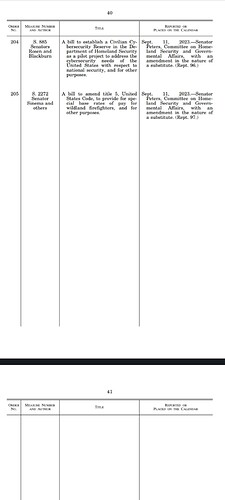Firefighter pay escalates tensions between Biden administration and House conservatives
The Forest Service may have slightly more wiggle room to maintain boosted firefighter pay than it’s letting on — but not nearly to the extent House Republicans are claiming.
As Congress approaches a critical Sept. 30 deadline to fund the government, the Forest Service has said nearly 20,000 of thefederal firefighting workforce could see their paychecks cut in half come October if Congress doesn’t extend temporary payincreases. But Republicans on the House Natural Resources Committee are accusing the Forest Service of misleading them on how quickly a fund bumping pay for firefighters will run dry. Aides said that as recently as last week, the agency told them that “there would be no money” and “there was nothing to shuffle around.”
“It’s just kind of a bewildering situation for us,” said one of the staffers, who spoke on the condition of anonymity to talk candidly about the alleged discrepancy. “Our priority is making sure that wildland firefighters are taken care of and that they’re also getting the best and most accurate information possible.” Lawmakers generally agree that wildland firefighters are underpaid and overworked, with the nation experiencing its most damaging wildfire seasons on record in the past three years. So when Congress passed the 2021 Bipartisan Infrastructure Law, it included $480 million to temporarily boost firefighter pay in fiscal years 2022 and 2023.
According to a recent data table, the Forest Service, which is housed by the Agriculture Department, still had about a quarter of those funds, or $119 million, remaining in its account roughly two weeks ago. That table showed the agency had already spent 75 percent, or $361 million of those mandated funds. The Republican staffer told The Climate 202 that, by their calculations, the Forest Service should have enough money left in its bank to guarantee pay for federal firefighters through May 2024.
But a USDA spokes person, Democrats on the committee and union officials have all said that’s incorrect. “We have been incredibly transparent about the status of funds as we make our case that a permanent pay fix is needed for the federal wildland firefighting workforce, but the misinformation they’re sharing today is disingenuous to those very firefighters,” the USDA spokesperson said, adding that the GOP assertions “are based on a misunderstanding and miscalculation of data.”
The numbers
Here’s the breakdown:
As of Sept. 13, $109 million remained in the Forest Service’s infrastructure law account to fund raises for wildland firefighters. The most recent pay period ended on Sept. 9. It will cost roughly $30 million to cover the costs of raises through the last pay period in this fiscal year. Then, there is another $30 million set aside for cost overruns and corrections, or for things like overtime and hazard
pay. Notably, the agency has also set aside $25 million in compliance with the law from those same funds for mental health services. This money will remain in the account indefinitely until the Forest Service finds a way to use the funds.
So, the total undisclosed funding left over — which those familiar with the internal budget said is likely the number that the House Republicans were looking for — is $24 million. The USDA says this amount can probably cover two additional pay periods of raises, or up until Nov. 5, adding more than a month onto the supposed expiration date.
G. William Hoagland, senior vice president of the Bipartisan Policy Center, said that while he hasn’t reviewed the specific numbers, “if they have unobligated, unspent moneys that they have available, and there’s no restriction on those being carried over, then yes — then the cliff would be softened.”
But Steve Lenkhart, executive director of the National Federation of Federal Employees, said the difference of only about 30 days doesn’t really amount to “funding that was hidden under a bookshelf somewhere,” comparing the time frame to “tomorrow in congressional terms.”
The details
The spat comes as the NFFE, which represents about 100,000 public employees in the federal government,estimates that 30 percent to 50 percent of the federal firefighter workforce could walk off the job in the nextyear if Congress doesn’t quickly approve future funding. Such resignations en masse could have a profound impact on the nation’s ability to tackle fierce blazes at the peak of wildfire season, which is becoming longer and more intense in a warming world, Lenkhart said.
Lawmakers in both chambers have introduced bipartisan bills to at least codify the current pay increase issued by the 2021infrastructure law, which bumped firefighter paychecks to a minimum of $15 per hour and increased pay by $20,000 or 50 percent of base salary, whichever was lower. And the Biden administration has asked Congress to include $60 million for firefighter pay in a supplemental spending package by the end of the month.
Still, the Republican staffer said that the House Natural Resources Committee will likely conduct major oversight of the Forest Service in the coming months in light of the standoff.
A Democratic spokesperson for the committee told The Climate 202 that “despite the majority’s distortion of the facts to claim otherwise, failing to fund the government and the President’s supplemental request will have real, damaging impacts on thelives of the wildland firefighters we depend on to keep us safe.”


 …Peace… What if climate change ushers in slow fire seasons…just saying…
…Peace… What if climate change ushers in slow fire seasons…just saying…